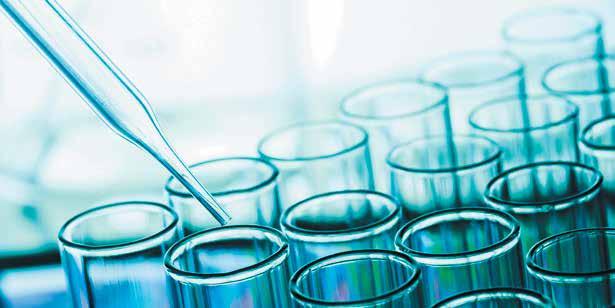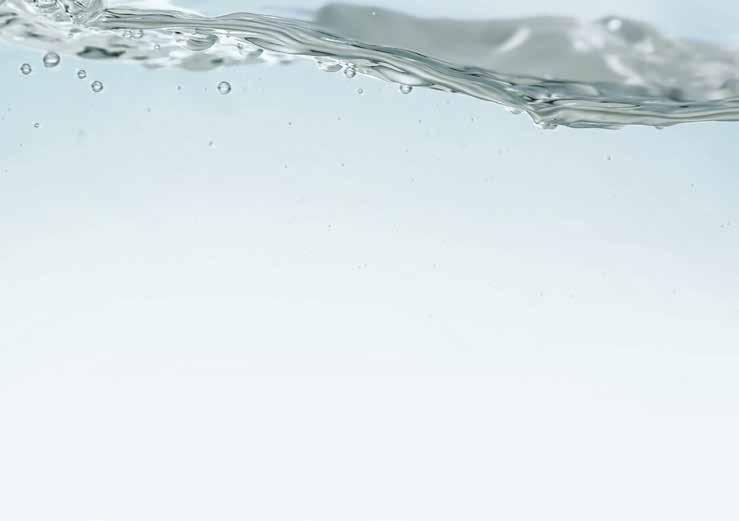
10 minute read
A sustainability transformation worldwide
How the DSM initiative can move beyond corporate confines to the aquaculture landscape in Asia.
We Make It Possible” – this is the challenging cutting edge, but committed initiative, that DSM “ Animal Nutrition and Health (AHN) launched in August 2020. It is targeted at making sustainable animal protein production while reducing environmental costs – what a populous burgeoning world needs. The goal is better food, health and nutrition and to grow aquaculture, reducing the reliance on marine resources.
It is not an impossible challenge, said Ivo Lansbergen,
President DSM ANH. “Sustainable animal farming to feed billions at lower cost to the environment is achievable through a holistic, concerted transformation within the agriculture industry itself.
It reflects a win-win collaborative effort to benefit all stakeholders, because the goal is to “provide affordable proteins to the world population and make it profitable for farmers while reducing the footprint of animal farming.” Achyuth Iyengar, Director Speciality Products (Asia Pacific) and Chiow Yen Liew, Regional Marketing Manager Aqua (Asia Pacific), explain what galvanises the company to come up with “We Make it Possible”, what this means for aquaculture, and how DSM will leverage on its expertise to play its part in fostering sustainable aquaculture.
What are the key drivers behind this initiative, specifically on aquaculture?
AI: Marine resources and aquaculture act as invaluable sources of proteins around the world; for more than 3.1 billion of the global population, fish protein accounts for at least 20% of their intake of animal protein. Aquaculture growth has been heavily dependent on the extraction of omega-3s from wild-caught fish for fishmeal and fish oil production in aquafeeds, such as for commercially farmed salmon, trout and marine shrimp. Within the next 10 years, we expect global demand for seafood to rise by 30 million tonnes. This growing demand, which is already placing tremendous pressure on our planet’s finite natural resources, will take our food systems well beyond the planet’s boundaries. Already, around 33% of the world’s fisheries are either depleted or overfished. Continuing to operate as we have done in the past is no longer an option. Providing enough animal protein for a growing population, while reducing the environmental costs of farming, calls for urgent, collaborative action across the entire value chain. The time has come to step out of merely being a part of the value chain, and be the change agent to advocate for, bring together collaborative efforts of industry players, and lead them into a sustainability transformation that extends beyond corporate confines, farming fields to industry wide spheres, ultimately worldwide transformation. Lansbergen said, “We see ourselves, steering the global conversations, connecting the various stakeholders of the farming ecosystem, thinking ahead, generating ideas and accelerating new smart ways of working.”
This initiative comes after many years of investment and innovation in scientific solutions searching for real answers to the challenges facing the agriculture industry. It marks not a new beginning, but a significant acceleration of the journey towards a more sustainable future. How can this initiative benefit
aquaculture?
Achyuth Iyengar: Tackling food safety and loss amidst global demand Chiow Yen Liew: Aquaculture needs to achieve sustainable growth, for now and in the future.
Ours is a global strategic initiative which aims to lead a robust and achievable transformation worldwide in sustainable animal protein production. Through cutting edge science and innovation, the initiative aims to connect stakeholders (from producers, farmers, processors, retailers to consumers) to address the major challenges facing the animal farming industry and accelerate sustainable, scalable solutions that will foster a brighter future.
We are working hard to reduce global food loss and waste. Globally, over 1 billion tonnes of food is wasted annually. Our ambition, therefore, is to reduce food loss and food waste by 50% in the next decade, and we have signed the Sustainable Development Goals (SDGs) to affirm our commitment to this cause. By applying our expertise on optimum vitamin nutrition, we seek to limit food loss and waste at every stage in the food supply chain.
In addition to tackling global food loss and waste, we also seek to improve the health and welfare of animals at every stage of life to create more sustainable food systems.
CYL: Specific to aquaculture, we aim to reduce our reliance on over-exploited marine resources by developing alternative sources of highly unsaturated omega-3 fatty acids and protein raw materials to enable the industry to achieve sustainable growth, for now and in the future. Our joint venture with Evonik, Veramaris, creates a sustainable substitute to fish oil derived from natural marine algae, which is currently undergoing trials across Asia Pacific. Developed in a large-scale, land-based waste-free fermentation process, this algal oil provides equivalent levels of omega-3 EPA and DHA as 1.2 million tonnes of wild fish. Our feed enzymes improve the digestibility whilst increasing the nutritional value of plant-based feed raw materials, thus lowering the reliance of fishmeal required for production.
Collectively, these innovative science-based solutions aim to reduce our reliance on marine resources and foster the sustainable growth of healthy and nutritious seafood to meet the growing needs of a growing population.
The initiative aims to make aquaculture more sustainable. In your view, where is Asian aquaculture today with regards to sustainability?
CYL: Aquaculture, like any other animal-based protein production, is resource dependent and relies on land and feed. As a result, this gives rise to environmental impacts. Although aquaculture is often seen as a more environmentally friendly source of animal protein as compared to other sources of land based animal proteins, it faces increasing criticism for its environmental impact and depletion of natural resources.

AI: Today, almost half of the global fish supply for human consumption is from aquaculture with 90% of the production volume produced in Asia. Given Asia’s prominent role in aquaculture output, the pressure to deal effectively with food safety, quality issues, as well as to minimise social and environmental impacts, is intense.

The race to have a more sustainable aquaculture production in Asia requires support across the value chain. At DSM, we believe in adopting a systems perspective on sustainability: from the use of sustainable resources to responsible production cognisant of managing environmental impacts; all of these whilst meeting the demands of the value chain.
A responsible production that considers better use of raw material; produces good quality feed with highly digestible nutrients for different development stages; having appropriate on-farm feeding; and proper farming technologies, should be adopted. For example, the use of enzymes in environment management and aquafeeds should be accelerated. We have seen how their catalytic capabilities have transformed the animal husbandry industry whilst ensuring the animals have the welfare features which allow them to thrive. We can do this in aquatic species too.
Health and nutrition affect the sustainability of aquaculture. How does DSM want to transform this?
CYL: A sustainable aquaculture production must provide a survival rate and growth performance that allow farmers to generate profits. Disease has been one of the key challenges in the aquaculture industry in Asia, resulting in huge losses.


At DSM, we prevent the spread of diseases, manage health and welfare of aquatic animals right through macro- and micro-nutrient levels, such as with OVN™ and functional ingredients in feed as excellent alternatives to a healthy diet, leading to better health and higher survival rates that maximise production yields and greatly increase food security.

Contact Syndel (800) 283-5292 / salesasia@syndel.com GLOBAL LEADER IN FISH HEALTH SOLUTIONS


Anesthetics / Treatments / Spawning Biosecurity / Antimicrobials Nutrition / Transport


Under the umbrella of “We Make It Possible”, we take an active role in improving food safety, tackling the use of antimicrobial resistance (AMR) through antibioticfree production.
In protein production via aquaculture, which are your priorities to achieve your goals of ‘improving quality of fish, making efficient use of natural resources and reducing AMR’?
AI: We believe in a systems perspective to sustainability. The overarching goal of our aquaculture solutions is to support the use of sustainable resources, encourage responsible production that considers the environmental impacts, and tackling AMR to meet the demands of the entire value chain.
We strive to make efficient use of natural resources by providing more flexibility in aquafeed production using feed enzymes and reducing the aquaculture industry’s reliance on fishmeal. Similarly, with Veramaris’ algal oil, we provide the much-needed omega-3s traditionally found in fish oil without having to rely on wild fish stocks.
Technologies applied in our products extend shelf life. Antioxidants like vitamins C and E are scientifically proven to slow down oxidation processes, extend shelf life, and reduce spoilage and waste, making aquaculture products more available for consumers and increasing profit margins for farmers.
How will DSM measure itself as an agent of change?
AI: Our initiative aims to drive transformation that relies on the collaborative efforts of all industry players to address the challenges facing our industry. It calls for greater engagement amongst stakeholders and greater focus on how our fish is produced - animal welfare standards, the provenance, and the environmental footprint it produces. Our success is grounded in the six sustainability platforms and the tangible impact our efforts bring towards achieving the SDGs.
We will achieve our targets by ensuring that all new investments by our business are carbon neutral, and we have dedicated investment programmes on renewable energy and energy efficiency. For example, we have adopted an Internal Carbon Price €50/tonne CO2eq in the valuations of key investment projects and in the profit and loss statements of the business groups for internal management reporting. In 2018 DSM also concluded a new €1 billion Revolving Credit Facility with our long-term banking partners that links the interest rate payable to our GHG emission reductions, underscoring the importance of sustainability in everything we do – including corporate finance.
At DSM, sustainability is fully engrained in our purpose, strategy, business and operations. Our approach for bringing about positive change is to improve, enable and advocate. We seek to improve our operations by decreasing our phosphorus and nitrogen emissions into water bodies; to enable our customers and partners deliver sustainable and healthy solutions for the planet and our society; and to advocate and accept the responsibility we share to drive change and be a strong contributor to society.
“We Make It Possible” demonstrates our ongoing commitment to provide real answers to the challenges facing the aquaculture industry and marks a significant acceleration towards a more sustainable future.
Reducing our reliance on marine resources
THE CONTEXT
Over 3 billion people consume seafood as at least 20% of their daily protein intake
By 2030 the demand for seafood estimated to rise by ~30 million tons
33% of ocean fisheries are overfished
BUT
Aquaculture also relies on wild caught fish for fish feed as a source of:
Omega 3 EPA & DHA, derived from fish oil Protein
OUR AMBITION
Reduce our reliance on finite marine resources for fish feed, by developing alternative sources of: Omega 3 EPA and DHA and protein raw materials to meet the demand
OUR SOLUTIONS
Veramaris®
Cultivates natural marine algae, in a large-scale, land-based, waste-free production
Produces algal oil with 2X omega-3 EPA and DHA as fish oil
1 ton Veramaris® algal oil = 60 tons of wild catch Feed Enzymes
Improves digestibility + increases nutritional value of plant-based feed raw materials
Enhances fish growth in low and zero fish meal diets
Lower levels of fish meal needed in fish diets
reduced reliance on fish oil Greater flexibility in feed formulations + reduced reliance on fish meal
THE RESULT Ground-breaking solutions that help aquaculture grow sustainably and produce healthy, nutritious seafood










